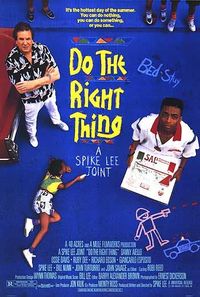
If there’s one film I know inside out, back to front, and upside down, it is Spike Lee’s Do the Right Thing. It’s a film I’ve watched many times. Spike Lee directed, wrote, produced, and starred in the film. It’s a film about a day in the life of a neighbourhood called Beford-Stuyvesant (known as Bed-Stuy) in Brooklyn, New York city. It’s a black neighbourhood, and race is a central theme of the film. The action is a montage of scenes in the life of the neighbourhood, all of which take place on an extremely hot summer’s day. With the oppressive heat as a backdrop, tension builds up within the community as the day unfolds, and the pressure leads to an explosion of action at the end of the film.
The film opens with footage of Rosie Perez doing some provocative, assertive dancing to the beat of Public Enemy’s Fight the Power, from their album Fear of a Black Planet. I used to love Public Enemy when I was a youngster – still do, I suppose. I’m a big fan of Spike Lee as well. I actually wrote my undergraduate dissertation on Spike Lee’s films. It wasn’t much of a dissertation to be honest – my supervisor called me an ‘underachiever’, which was pretty accurate.
A lot of the action in Do the Right Thing centres on an Italian-American business in the heart of the black community. Spike Lee’s himself plays the protagonist, Mookie, who delivers pizza’s for ‘Sal’s Famous Pizzeria’. Sal has a ‘Wall of Fame’ in the pizzeria made up of photographs of prominent Italian-Americans such as Al Pacino. One of the locals (called ‘Buggin’ Out’) takes exception to this, and demands some photos of African-Americans be put up on the wall. This leads to a series of confrontations that drive the action.

Giancarlo Esposito
Buggin’ Out is played by one of my own favourite actors, Giancarlo Esposito. He’s one of those guys who you’d recognise but probably couldn’t have identified if I hadn’t put a photo of him into this post. Off the top of my head, he’s also played Muhammed Ali’s dad in Ali (with Will Smith), and a cop in The Usual Suspects, but he’s been in loads of other stuff, usually playing character roles. He’s also been in a number of Spike Lee films. For my money, he’s one of the most versatile actors around these days. He’s played some hugely diverse roles in his career.
For me, the strength of Do the Right Thing is in its willingness to tackle identity politics head-on. I reckon it gives a very convincing picture of the complexity and diversity of racial issues, but I’m not going to try and capture that at the moment – to do justice to the film and the subject, I’d have to put a bit more time into it than I’ve got just now…
 I will just say that the film partly represents a conflict between the philosophies of Martin Luther King Jr. and Malcolm X, two prominent African-American leaders who were assassinated during the 1960s. Whereas Dr. King advocated non-violence, Malcolm X asserted the right of African-Americans in the US to rely on self-help to defend themselves against brutality. The film ends with a quote from each man, outlining his own take on whether the use of force is ever justified. Dr. King’s take on things was that violence is “immoral and impractical” as a solution, as it breeds hatred, and ensures that the cycle of violence will continue. The Malcolm X quote refers to who had the power in US society, bringing us back to the Public Enemy song that features so prominently in the film. Malcolm X believed that the problem of racism was so urgent and so systematic in the US that the black community should employ any means that were necessary to bring it to an end. Spike Lee juxtaposes these competing understandings, and challenges the viewer to reconcile them with the practical realities of Do the Right Thing.
I will just say that the film partly represents a conflict between the philosophies of Martin Luther King Jr. and Malcolm X, two prominent African-American leaders who were assassinated during the 1960s. Whereas Dr. King advocated non-violence, Malcolm X asserted the right of African-Americans in the US to rely on self-help to defend themselves against brutality. The film ends with a quote from each man, outlining his own take on whether the use of force is ever justified. Dr. King’s take on things was that violence is “immoral and impractical” as a solution, as it breeds hatred, and ensures that the cycle of violence will continue. The Malcolm X quote refers to who had the power in US society, bringing us back to the Public Enemy song that features so prominently in the film. Malcolm X believed that the problem of racism was so urgent and so systematic in the US that the black community should employ any means that were necessary to bring it to an end. Spike Lee juxtaposes these competing understandings, and challenges the viewer to reconcile them with the practical realities of Do the Right Thing.I know exactly what side I’m on. I’ve read Malcolm X’s Autobiography three times and I find his take on things pretty compelling. I think this film is actually what brought me into contact with Malcolm X’s life and thought. I’m no pacifist, and I agree with Malcolm X that for black Americans, when the US government consistently failed to do enough to protect them, self-defence should not be described as ‘violence’ but as ‘intelligence’. Malcolm X spoke in the context of a US where white supremacist attacks on African-Americans went unpunished. This was a culture of impunity for the death of 4 black girls in the bombing of a Birmingham church, and for the assassination of Medgar Evers, an official of the NAACP (National Association for the Advancement of Coloured People). Evers was immortalised in Bob Dylan’s Only a Pawn in their Game, and his assassin was only convicted in 1994 because he boasted of the murder at a KKK rally.
Do the Right Thing also stars Ossie Davis, the man who gave the eulogy at Malcolm X’s funeral, and one thing he said strikes me as quite important at this stage. He draws attention to the fact that Malcolm X had never been personally involved in any violence or disturbance. It was only a case of articulating a policy of self-reliance for a community who were the constant victim of savage attack. It seems reasonable in this context that they would take action to protect themselves and their communities.
Anyway, I got a DVD copy of Do the Right Thing at Christmas, and I’ve just watched the first 40 minutes or so of it. I’ve interrupted my viewing because I promised myself I’d try and improve my blogging frequency in 2007. Anyway, it’s a beautifully shot film, which is given a reflective edge by a lot of long takes and a pleasant jazz score by Spike’s dad, Bill Lee. In other places it becomes much more confrontational, such as in a famous scene (reprised somewhat in Lee’s The 25th Hour). A number of characters take turns addressing the camera with a string of targeted racial abuse. In turn, Puerto Rican, Italian, black, Korean and other characters vent a string of racial invectives against different groups such as Jews or Asians, such as John Turtorro’s rant against blacks which begins: “You gold-teeth, gold-chain wearing, fried chicken and biscuit-eating, monkey-ape-baboon” etc.
It’s an ensemble piece, with a lot of small roles by actors who have since become pretty well known, such as Jon Savage, Samuel L Jackson and Martin Lawrence. A lot of people reckon that all of Spike Lee’s films are about race, which is refuted by films like Summer of Sam and recently, Inside Man. He's a gifted filmmaker and shouldn't be reduced to nothing but an idealogue. But Do the Right Thing certainly has race up front and centre, and gets my vote as one of the best cinematic reflections on racial politics ever made.

